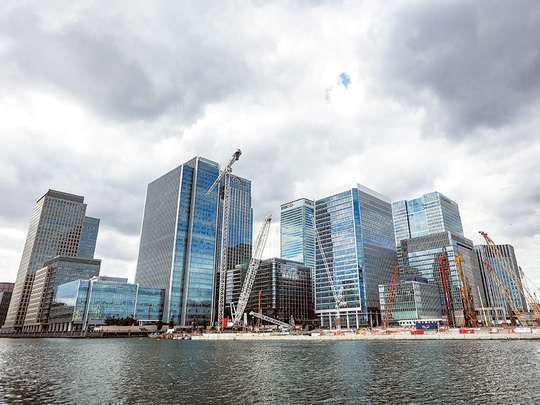
London: Prime Minister Theresa May has raised doubts about hundreds of billions of pounds worth of infrastructure projects by delaying a decision on the UK’s first new nuclear plant in a generation as the country prepares for a future outside the European Union.
Energy and transportation building plans left hanging by the UK’s vote to leave the EU include a high-speed rail line from London to the north of England, an expansion of airport capacity, urban transit improvements and the Hinkley Point nuclear station.
The projects are aimed at shoring up the UK’s creaking infrastructure, which economists say holds back productivity. Business leaders, worried about the economic effects of Brexit and the stretched state of the UK’s roads, railroads and power-generating resources, reacted with alarm when the government said on Thursday that it would defer a decision on the £18-billion ($23.8-billion) nuclear plant until the fall.
“We know that one of the best ways to stimulate the economy is infrastructure projects,” said Paul Drechsler, president of the Confederation of British Industry. “If life after Brexit is more difficult, then the best way to mitigate downside risk is infrastructure investment.”
Drechsler said spending on big projects would produce “stability and certainty” at a time when the UK faces years of negotiations over its EU exit. With many economists saying the UK faces a recession in the wake of the June 23 referendum, greenlighting new roads, rail lines, airports and power plants would provide jobs and signal that the country is investing in the future, rather than retrenching.
In a speech two days before she became prime minister, May called for a “proper industrial strategy” and suggested the UK Treasury should issue project bonds to finance infrastructure. But spending on public works could burden strained public finances at a time when ratings agencies have downgraded the UK’s credit.
Whether the UK can afford £405 billion worth of projects in the pipeline before the Brexit vote depends on how much the economy suffers, said Tony Travers, a professor at the London School of Economics.
“If it’s a modest hit in the first year or two of Britain leaving the EU, then the economy could certainly stand carrying on with these projects, possibly plus some new ones,” he said in an interview. “If the hit is bigger than that, and we’ll discover that quite soon, there may be less choice.”
Heathrow, Gatwick
Before the delay on Hinkley Point, former Prime Minister David Cameron’s government postponed a decision on expansion of London’s Heathrow or Gatwick airports, which could cost as much as £18.6 billion, until the autumn. Business groups and airlines say a new runway is needed at one of the airports to maintain the country’s competitiveness, but environmental groups and others are opposed.
New London Mayor Sadiq Khan has approved a more modest expansion of London City Airport, which is used by business travellers for short-haul flights to other cities in Europe, but that won’t alleviate pressure on the country’s biggest long-haul hub, Heathrow.
Another big project facing an uncertain future is the £56 billion High Speed 2 rail line, which would link London to Manchester and other cities in northern England, and the £27 billion-plus Crossrail 2 north-south transit line in London, which would supplement an east-west Crossrail line that is nearing completion.
The Taxpayers’ Alliance, a lobby group, objects to rising cost estimates for High Speed 2, which the government estimated in 2010 at £33 billion. The group says the price tag eventually could climb to £88 billion or more.
The UK’s net infrastructure spending fell last year to £33.8 billion, down 33 per cent from 2008, according to the Office for National Statistics.
“If we are overcommitted, we need to lighten the load — and that means stopping doing things,” Amyas Morse, head of the UK’s National Audit Office, said in a speech in July. “This can be done by not adding projects, or by cancelling existing ones.”
EU funding
Leaving the EU could tighten the squeeze because the UK might lose access to funding from the European Investment Bank, which increased lending to the UK to €7.7 billion ($8.6 billion) last year — two thirds of which was assigned to infrastructure projects.
While deferring decisions on big projects, May’s Conservative Party has been more specific about its plans for housing. With fast-growing London facing a squeeze, the party has set out a goal of building one million new homes during the current five-year parliamentary term, which began in May 2015. That would be a rate of 200,000 a year, up from the 156,140 that the National House Building Council says were built last year.
Lloyds Banking Group Plc Chief Executive Officer Antonio Horta-Osorio said the UK should take advantage of low interest rates to invest in big projects, too.
“This country has underinvested for years,” he told reporters last week. “Any investment project in infrastructure that would increase productivity in the country in the right projects and when you can borrow for a very long time at zero interest rates — I’m just saying that it is a serious option that should be considered.”
The CBI says every pound spent on infrastructure generates £3 in economic activity. The former government’s postponement of a decision on runway capacity at Heathrow or Gatwick sent a negative signal to the UK’s trading partners, Drechsler said, and some of the economic benefits that rapid expansion would have brought could now go to France or Germany instead.
“If there was always a case for infrastructure investment, it’s even more compelling now,” he said.











